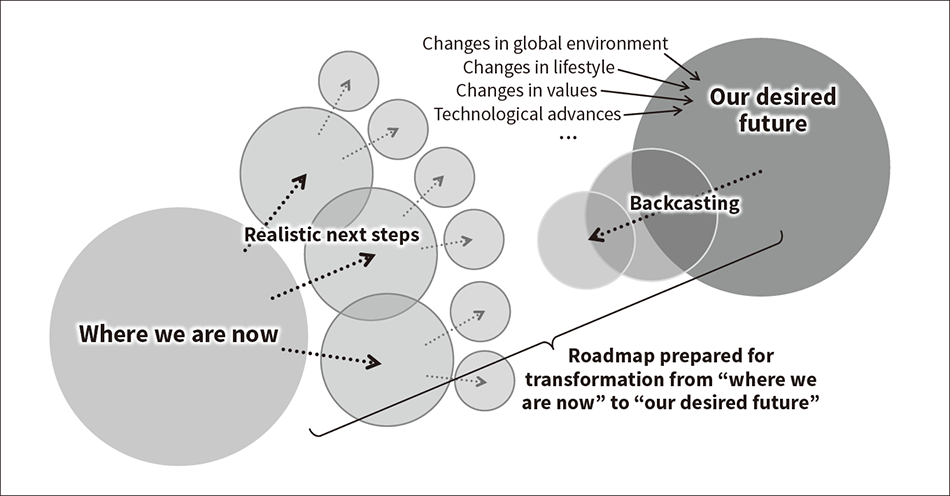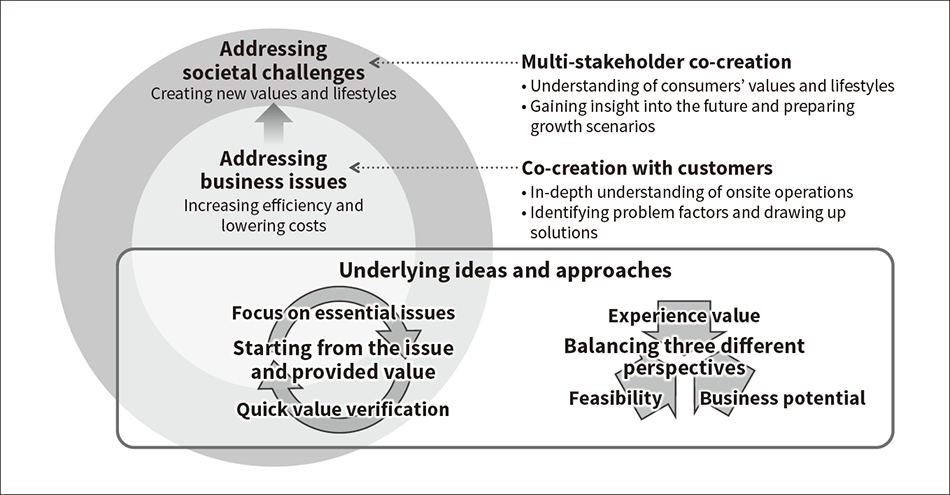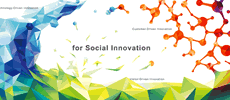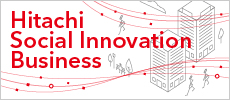Hitachi’s Co-creation Enhanced by Design and Digital Technology
Highlight
Hitachi aims to realize Society 5.0 through co-creation in which solutions are designed and implemented in tandem with customers. Hitachi also has been using design and data science to respond to the issues facing customers in various fields, as well as to develop methods and to train human capital for expanding the number of collaborative creators. At the same time, companies are responding to complex societal challenges and drastic changes in the business environment while pursuing the next stage of growth, and the creation of value that is not an extension of conventional approaches has become a management issue. As the objective of customer co-creation expands from solving onsite business issues, such as improving business efficiency, to creating demand through new value, Hitachi’s approach to co-creation is also evolving and building a proven track record of successful application. This article presents an overview of the evolution of co-creation approaches that utilize Hitachi’s design and digital technologies.

Introduction
Modern society faces a variety of challenges, including large-scale natural disasters, an aging society with a declining birthrate, and a deteriorating infrastructure. To solve these issues, Hitachi has been conducting collaborative creation (co-creation) with various stakeholders. The basis of co-creation is design thinking, which creates value through a quick trial-and-error process based on grasping the essence of the essential issues, and Hitachi has been working to expand the number of people involved throughout the company by converting the expertise developed by Hitachi’s in-house design organization into methods.
On the other hand, as the complexity of issues increases and the speed of technological innovation grows, it is essential to evolve the problem-solving approach itself through co-creation. This article presents an overview of the evolution of Hitachi’s approach to co-creation that uses its design capabilities and digital technologies.
Transition of Co-creation for a Better Society
Creation of Innovation through Co-creation
The Japanese government has clearly defined the concept of Society 5.0(1) as a vision of a society that aims at both solving societal challenges and achieving economic growth. This is supported by a system that highly integrates cyberspace and physical space, and Hitachi aims to realize this through the creation of Social Innovation Business. In order to create innovations and implement them in society, it is essential to examine them from a wide range of perspectives, including the experience value they provide to people, technological feasibility, and business potential. In this context, Hitachi has been conducting co-creation with customers and partners to identify onsite issues and to create new services that contribute to solving them.
Underpinning the co-creation work are the mindset and skills of design thinking, such as the approach of grasping essential issues by gaining insight into the context and pursuing the experience value for service recipients through repeated trial and error. In addition to developing NEXPERIENCE(2), a methodology for performing co-creation, Hitachi has also been expanding the human resources it has who are capable of performing co-creation within the company by running an educational program and certification system for design thinking. There are a steadily growing number of cases where not only design specialists, but also those in charge of business planning, sales, and system development are gaining the mindset and skills to lead the creation of innovation.
Also, Society 5.0 is a society that creates a cycle in which a digital twin is constructed in cyberspace using a wide variety of data, physical space is changed by actively utilizing artificial intelligence (AI), and the results are reproduced in cyberspace. Hitachi established the Lumada Data Science Lab.(3) in 2020 to tap into the latest trends in the rapidly changing field of AI and data analytics, enhance the skills of its researchers and engineers, and apply technology and expertise to society and business settings.
Responding to Increasingly Complex Societal Challenges
Figure 1 — Co-creation Activities at Lumada Innovation Hub Tokyo Specialists in various fields, such as design, data science, and engineering support co-creation activities. Lumada Innovation Hub Tokyo is equipped with space and facilities suitable for these activities, and is conducting exchange meetings to share advanced case studies, idea generation through workshops, and rapid value verification through prototyping.
Specialists in various fields, such as design, data science, and engineering support co-creation activities. Lumada Innovation Hub Tokyo is equipped with space and facilities suitable for these activities, and is conducting exchange meetings to share advanced case studies, idea generation through workshops, and rapid value verification through prototyping.
Hitachi has built up a proven track record of improving the efficiency of customer operations through co-creation, for example, by improving productivity at manufacturing sites and reforming work styles in offices. Also, in recent years, Hitachi has received growing numbers of consultations on more complex societal challenges, such as carbon neutrality, infrastructure upgrading, and measures to address population decline. These societal challenges involve people in a wide range of positions, such as companies, governments, and consumers, and it is difficult for a single organization to solve them alone. It is essential to narrow down the issues to be solved while involving a wide range of stakeholders, gather knowledge and ideas, and build consensus on measures while confirming their effectiveness. Hitachi established the Lumada Alliance Program in 2020 as a mechanism to address issues together with various partners. In April 2021, the company established Lumada Innovation Hub Tokyo (LIHT)(4) as a co-creation place for companies, governments, consumers, and others in various capacities to gather and combine their knowledge and ideas (see Figure 1). LIHT holds events to discuss and disseminate visions for the future society, and conducts workshops and idea validation to generate concrete service ideas. In only its second year of operation, approximately 10,000 people use this place annually to implement co-creation to solve social and customer issues with people from a wide range of perspectives, including corporate executives, onsite personnel, government agencies, consumers, and academia.
Addressing Management Issues for Business Transformation
Figure 2 — Preparing a Roadmap to Business Transformation Corporate managers must be ready for medium- to long-term social changes while responding to a growing number of daily changes. A roadmap must be prepared while maintaining a balance between “designing realistic next steps based on where we are now” and “backcasting from our desired future.”
Corporate managers must be ready for medium- to long-term social changes while responding to a growing number of daily changes. A roadmap must be prepared while maintaining a balance between “designing realistic next steps based on where we are now” and “backcasting from our desired future.”
As societal challenges of high complexity have become high on the agenda, there have been increasing opportunities for corporate executives to participate in co-creation projects. The discussions include how to respond to the dizzying changes in the external environment, what kind of value can be provided to the coming society, and how to evolve toward the desired future. Here, a balanced approach that combines “backcasting from our desired future” and “designing realistic next steps based on where we are now” is necessary (see Figure 2).
For the former, backcasting provides insight into what people’s values and lives will be like in the future and what kind of experience value people are looking for. Hitachi has developed a methodology called “Kizashi” (signs) for identifying future trends and applied it to co-creation. Through a series of co-creation projects for local revitalization and workshops with junior and senior high school students, Hitachi is accumulating and disseminating real opinions about changes in values and lifestyles. The study must be conducted from the standpoints of experience value, feasibility, and business potential. In addition to vision designers and service designers with skilled insight into experience value, technologists and business designers will also participate in the study.
For the latter, the design of feasible steps requires experts in digital engineering who are skilled in materialization and have the ability to design growth scenarios for shaping what the desired future will look like. In digital engineering, GlobalLogic’s activities are covered in this issue’s Cover Story “Activities 3: Driving Digital Transformation in Japanese Market through Co-creation by DX Specialists.” Hitachi engineers, including GlobalLogic engineers, are participating in the study of what kind of technology will be used to realize the desired future. In addition to technical feasibility, it is also important to consider the value provided and the business potential, and based on these perspectives, Hitachi is working together with management to create growth scenarios and develop methods.
Evolution of the Co-creation Approach Discussed in This Issue
The previous section described the issues that Hitachi addresses in its co-creation projects and the evolution of its approach (see Figure 3). This section introduces the co-creation processes and methodologies that address management issues for business transformation, with a focus on the topics raised in this issue of Hitachi Review.
Figure 3 — Co-creation Approach for Expanding Issues The approach is based on considering measures while taking into account the balance between experience value, feasibility, and business potential, starting from the essential issues and the value provided, while evolving the method of co-creation as the issues to be addressed expand.
The approach is based on considering measures while taking into account the balance between experience value, feasibility, and business potential, starting from the essential issues and the value provided, while evolving the method of co-creation as the issues to be addressed expand.
Design of Business Growth Scenarios for Shaping the Desired Future
Companies are expected to take actions to realize sustainability while also ensuring business growth. Hitachi has used NEXPERIENCE, a co-creation methodology, for several hundred projects and has built up a track record of solution development centered on improving customers’ operational efficiency. On the other hand, in order to meet the points in the agenda required by society as a whole, such as sustainability, a company must have the technology to shape the desired future and the technology to draw the path to reach that future while growing the business.
To this end, Hitachi developed a method to prepare business growth scenarios to realize not only improved business efficiency, but also business growth by creating new demand while also realizing the future that society demands. Societal challenges are becoming increasingly complex, and partnering with a variety of companies is essential to shape the desired future. The developed method is a step-by-step process that defines how partnering among multiple companies can achieve both economic value and social value. For details, see the articles “Engagement with Customers on Business Growth Scenarios that Anticipate Future Value” and “New Methodology and Applied Example for Identification of Issues to Enable Action on Societal Challenges” in this issue.
Extracting Changes in Values and Lifestyles
The COVID-19 pandemic, which began in 2020 and spread globally, quickly accelerated a number of social changes. The rapidly growing recognition of the Sustainable Development Goals (SDGs) has also brought about changes in what corporate stakeholders, such as shareholders, employees, and consumers, consider important. As a result, companies are faced with new management issues that cannot be dealt with simply as an extension of their conventional business operations.
Previously, Hitachi conducted ethnography to extract the actual business conditions, issues, and latent needs of its customers. Applying ethnography, which has proven itself in a wide range of business domains, Hitachi has recently broadened its perspective to include a wider range of stakeholders involved with its customers and is attempting to capture changes in values and lifestyles. Hitachi also experienced a period when onsite observation research was difficult due to the COVID-19 pandemic, leading it to develop a remote research method. The article “Creation of Digital Services through Consumer Understanding” in this issue describes the methodology and presents an example of its application in the railway sector.
Use of Digital Technology in Co-creation
Data science, which is based on data-driven scientific methodologies and processes and utilizes AI and statistics to create business value and implement it in society, is becoming increasingly important. For example, Hitachi has experience in planning optimization to continuously maintain and improve productivity and profitability, and in materials informatics (MI), which transforms the process itself by utilizing digital technology in the development of new materials. Hitachi has also developed a framework for quickly identifying problems to be solved in the field of data science and for smoothly connecting insights gained from data analysis to system implementation(5). This framework has been applied to a wide range of fields, including infrastructure-related businesses, manufacturing, and transportation, and has had the effect of increasing the speed of provided value.
Co-creation projects utilizing blockchain are also being implemented. In the proof-of-concept project in a local community, Hitachi verified with users the image of a future society in which residents and local businesses are loosely connected and cooperate with each other in a world where the local government is becoming vulnerable due to the declining birthrate, aging society, and shrinking population.
Furthermore, the use of the metaverse in co-creation is also increasing. In areas where the metaverse is applied to industry, there are efforts to implement planning and study of onsite work in a virtual space. When conducting discussions that combine diverse wisdom and ideas, it is also important to foster an atmosphere in which participants can exchange opinions equally from the same standpoint. Moreover, efforts are underway to build the collaborative space itself into a metaverse.
Conclusions
This article has presented an overview of the evolution of Hitachi’s co-creation approach which uses design and digital technologies to shape the desired future. While following the basic concept and process of co-creation starting from the issues and the values provided, Hitachi’s approach has evolved with the expansion of the issues to be addressed.
Hitachi will continue to work with a variety of stakeholders, including consumers, government agencies, and businesses, to achieve economic growth and solve societal challenges by applying co-creation in more and more cases. Hitachi is also updating its co-creation methodologies and knowledge, and will globally deploy the solutions created in Japan, a developed country facing its own unique set of challenges.
REFERENCES
- 1)
- Cabinet Office, “Sixth Science, Technology, and Innovation Basic Plan”
- 2)
- Hitachi, Ltd., “NEXPERIENCE”
- 3)
- Hitachi, Ltd., “Lumada Data Science Lab.” in Japanese
- 4)
- Hitachi, Ltd., “Lumada Innovation Hub”
- 5)
- S. Matsumoto et al., “A Framework for Adding Value to Data Scientist Activities,” Journal of the Institute of Electronics, Information and Communication Engineers (Oct. 2022)
- 6)
- Hitachi, Ltd., “Venturing into Future Living Labs with Local Communities”





